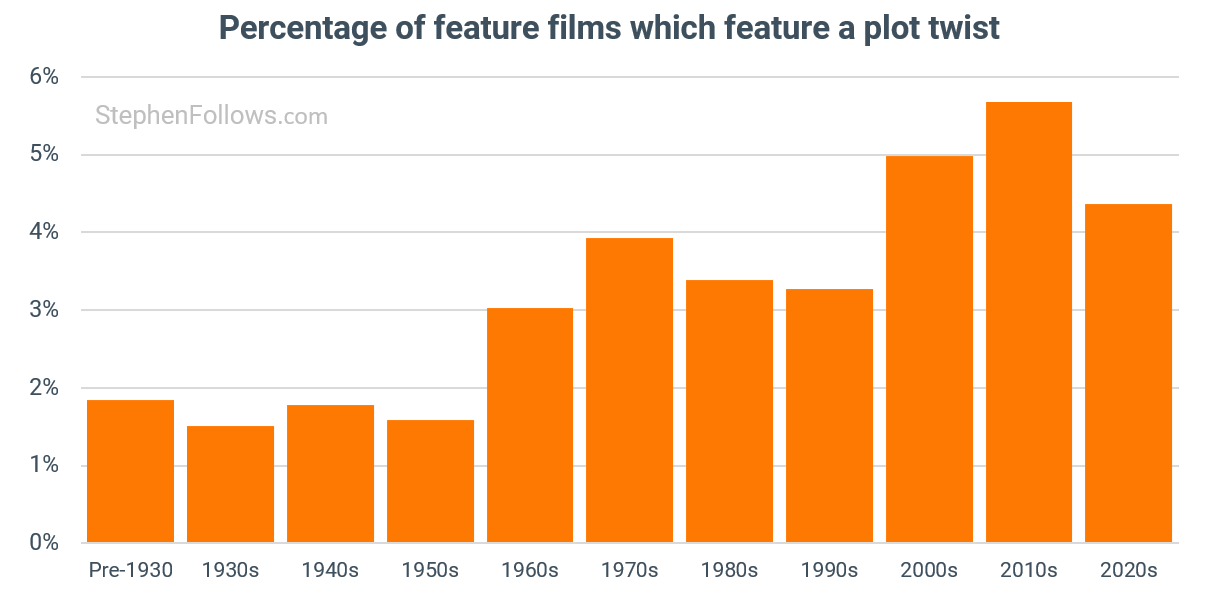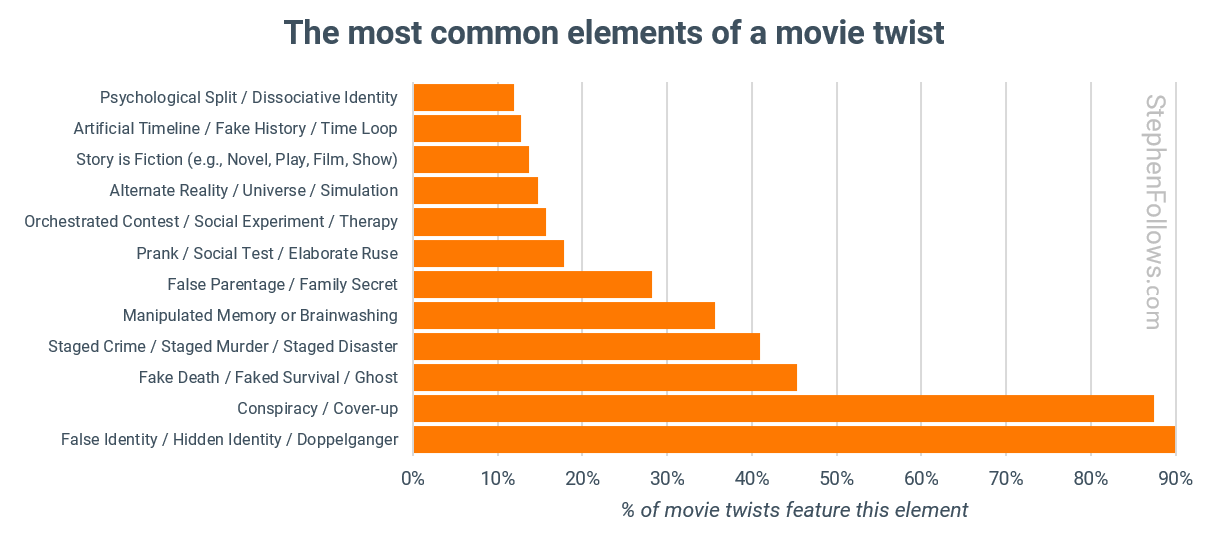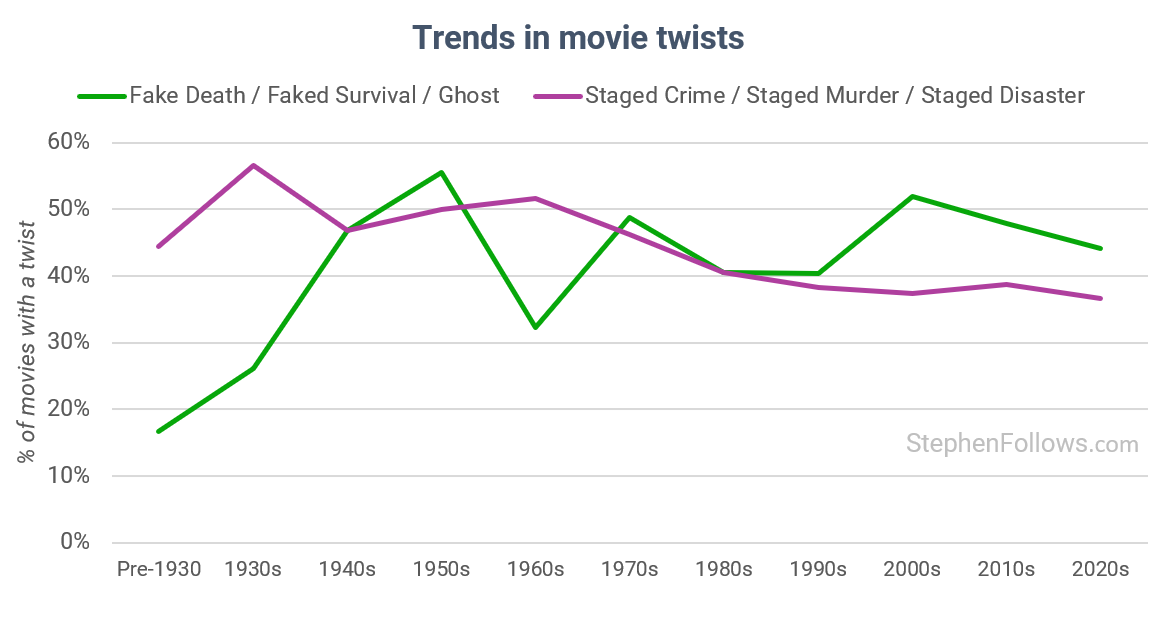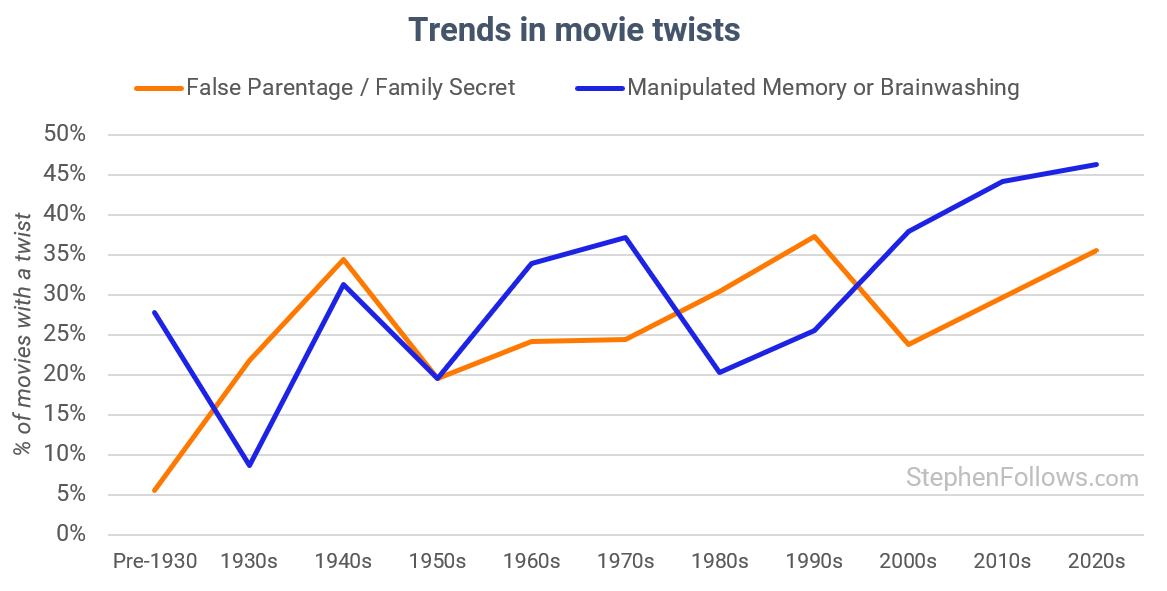What percentage of movies have a plot twist?
How rare are real twists? I ruined 984 endings to find out.
STOP!
I really must impress upon you just how much this article will ruin a bunch of movies for you.
Seriously.
This article reveals the endings of 59 excellently crafted movies.
I can’t even give you a trigger warning as to which ones as to do so spoils that they have a twist.
So unless you are one of those weird people whose curiosity and love for data is somehow more important to them than respecting the hard work of filmmakers and their own chance of narrative fulfilment, close the tab and walk away.
.
.
Still here?
Good. Me too.
I love a movie with a twist
A well-executed twist becomes part of a movie’s identity.
But how often do they actually occur?
To find out, I analysed the plots of 26,710 movies, identifying 984 that contain a major plot twist.
What is a twist, anyway?
What counts as a true plot twist is never going to be something everyone agrees on.
In conducting this research I got ever-deeper down the rabbit warren of twists. Here’s what I learned:
Some twists are obvious and without much debate. Psycho is defined by its material reveal, Planet of the Apes has its Statue of Liberty and The Others holds back its spooky truth until the final beat.
Some twists completely change how a movie works, making the first re-watch a wholly new viewing experience. I’d put The Usual Suspects in that category, along with The Prestige, Oldboy, Shutter Island, and Primal Fear.
There are controversial twists. The end of The Thing leaves us with uncertainty, not a revelation, and in The Haunting they never fully confirm or deny what we want to know (one might include Inception in here too).
Some films use a perspective shift, letting us see the story through a new lens only late in the game. The ending doesn’t upend the entire plot, but it nudges us to re-examine everything, as in Atonement or Eternal Sunshine of the Spotless Mind.
Metatextual reveals flip the relationship between film and viewer. Sometimes the movie stops the show or pulls back the curtain, reminding us that this world is a construction and making us question what’s real and what’s artifice such as Adaptation’s blending of fact and fiction.
Some endings go for a moral or emotional undercut. Instead of wrapping up with satisfaction, triumph, or closure, they end on a whimper which is twist-like. The Graduate and La La Land leave both their characters and we the audience suspended in a state of emotional uncertainty.
It’s not always clear when “The Twist” happens. Some films go for the collective reveal, when we all learn about it together, such as in Fight Club when we’re told that Tyler isn’t real. Some creep up on us, such as the reveal of the non-linear narrative in Arrival. And then there’s movies trying for the former but there will always be some people who say they spotted it early (à la The Sixth Sense).
I took a pretty broad approach to the movies I studied. I wanted to look at all reveals of information which fundamentally alter what we thought we knew in a surprising way.
How often do movies do the twist?
Across all the movies I looked at, 3.7% had what I regarded as a twist.
However this has not been a consistent feature. They were fairly rare until the 1960s, and really blossomed in and after the 2000.
Before I carry on, I wanted to give a quick shout out to another film data Substacker who I think does incredible research and writing. Stat Significant is a free weekly newsletter featuring data-centric essays about movies, music, TV, and more. When do we stop finding new music? Which TV shows got their finale right, and which didn't? Which movies popularized (or tarnished) baby names? It’s totally free and you can subscribe below:
Right, let’s do the twist again….
The most common types of plot twists
The most common element to movie twists is that of a reveal about someone’s previously-hidden identity and/or a coverup of the hidden information.
Some ideas overlap. Gone Girl uses a fake death and an unreliable narrator to flip the story midway through. The Invitation plays on suspicion until the final moments confirm the worst. Triangle traps its protagonist in a looping nightmare that only makes sense once you realise time isn’t moving the way it should.
Twisting in the winds of time
Some twist types never seem to go out of fashion, while others come in waves.
Fake deaths, staged crimes and secret conspiracies dominated in the early decades. Les Diaboliques kills a man off, hides the body, then brings him back to life. Laura builds its entire middle act on a woman we think is dead. The Third Man has Harry Lime step out of the shadows long after his funeral.
These kinds of twists are clean and dramatic, and give the audience a clear shock. But they’ve waned in their popularity with filmmakers. Staged events in particular have dropped off sharply since the 1960s. Fake deaths remain common but are less likely to anchor the entire plot.
The twists that have gained ground are the ones that unravel the mind.
Black Swan slips between reality and hallucination without warning.
Jacob’s Ladder keeps the viewer trapped in a dying man’s fragmented consciousness.
Stay and The Secret Window both dismantle their characters’ sense of self as the story collapses inward.
Family secrets have held steady. Stoker hides a history of violence beneath a polished surface. We Need to Talk About Kevin builds tension around a mother’s fear of what her son truly is. The Skeleton Key and The Orphan each reveal truths about family roles and identities that change the story’s entire shape. These twists don’t always shout. But when they land, they turn domestic space into something dangerous.
Let’s twist again
Finally, let’s go for a scorched earth policy on revealing twists. Below are a few of the interesting movie twists I learned about during this research:
M (1931) The child murderer is revealed to be the terrified, mentally ill man that all the various criminal elements of the city have been hunting, not a scapegoat.
The 39 Steps (1935) The secret the spies are after is not a document, but a man who has memorized a vital government secret in his head.
The Lady Vanishes (1938) The old lady that everyone believes never existed is revealed to be real and the victim of a sinister conspiracy, overturning the protagonist’s sanity and credibility.
Rebecca (1940) Rebecca’s supposedly noble death was actually a suicide meant to look accidental, and Maxim de Winter confesses to having hidden the truth, shocking his new bride and the police.
Suspicion (1941) The audience believes Cary Grant’s character is a murderer, but in the twist ending, he is actually innocent and the heroine’s suspicion is proven unfounded.
Notorious (1946) Alicia’s allies seem to abandon her, but in a tense final twist, Devlin rescues her in front of the man she married under false pretences, dooming the villain to his fate.
Rear Window (1954) Jeff’s wheelchair-bound protagonist's spying on his neighbours pays off when he discovers he was right all along, a neighbour really did commit a murder only to turn the tables on Jeff by coming for him.
Witness for the Prosecution (1957) Christine confesses to perjury to save her husband, only for it to be revealed she was planning to kill him herself, shocking both the courtroom and the audience.
Anatomy of a Murder (1959) Just when the defence succeeds in acquitting the accused, it is implied that the alleged rape victim and her husband manipulated the system, raising doubts about whether justice was truly served.
Charade (1963) The charming love interest is revealed to be an undercover agent with multiple identities, not a mere suitor, and the actual villain turns out to be someone the protagonist trusted.
The Manchurian Candidate (1962) The American hero has been brainwashed to become an assassin against his will and is ultimately forced to kill his own mother to stop the plot.
The Servant (1963) The master becomes mentally and emotionally overpowered and dominated by his once subservient manservant, completely reversing the power dynamic by the film's end.
Don’t Look Now (1973) The mysterious figure in a red coat is revealed to be not a vision of the protagonist's dead daughter but an adult murderer, leading to an unexpected and tragic ending.
The Wicker Man (1973) Sergeant Howie’s investigation was a set-up all along to lure him to the island so that he can be sacrificed in a pagan ritual.
Chinatown (1974) Just when the detective believes he has uncovered the truth, he learns that Evelyn’s daughter is also her sister, unravelling a web of abuse and corruption that he cannot resolve.
The Empire Strikes Back (1980) Darth Vader reveals that he is Luke Skywalker's father, completely changing the audience's understanding of the hero and the villain.
The Vanishing (1988) The protagonist willingly takes the same drugged drink that was used to abduct his girlfriend and finds himself buried alive, shocking the audience.
The Stepfather (1987) The seemingly perfect stepfather is revealed to be a serial murderer who reconstructs a new life after killing each family that disappoints him.
The Game (1997) After a series of threatening and life-destroying events, Nicholas discovers that the deadly conspiracy against him was actually an elaborate, staged game for his birthday.
Twelve Monkeys (1995) The “Army of the Twelve Monkeys” was a red herring, and the real cause of the apocalypse comes from an unexpected, almost invisible source.
Donnie Darko (2001) The protagonist sacrifices himself by allowing himself to die, thus erasing the film’s disturbing events from ever happening in a paradoxical twist.
Saw (2004) The corpse that has lain in the room all along stands up and is revealed to be the mastermind Jigsaw, who orchestrated the entire game.
Identity (2003) The ten strangers dying at the motel are actually multiple personalities inside the mind of a man awaiting execution, and the killer is a personality within him.
The Gift (2015) The seemingly well-meaning visitor, Gordo, proves to not be so harmless as a final act leaves the characters and the audience questioning who was truly the villain.
Promising Young Woman (2020) Cassandra’s careful revenge plot leads to her murder, but she posthumously exposes the truth, completing her plan even in death.
Barbarian (2022) The home-invasion scenario pivots suddenly to introduce a new twist involving hidden tunnels and a monstrous resident, upending the apparent narrative.
Glass Onion: A Knives Out Mystery (2022) The investigation’s events are shown from a different perspective, gradually revealing a different truth about who the true mastermind was all along.
Notes
Todays research was based around movie plots as described on Wikipedia and IMDb (if Wikipedia was too short).
















My biggest question after reading this: are movies with plottwists considered to be better movies?
Here's a question though...are movies with plot twists as 're-watchable' as those without? I've watched Jurassic Park dozens of times, a comforting, familiar winter couch film. The Usual Suspects however, I would never re-watch because so much of the satisfaction of watching has already been expended.